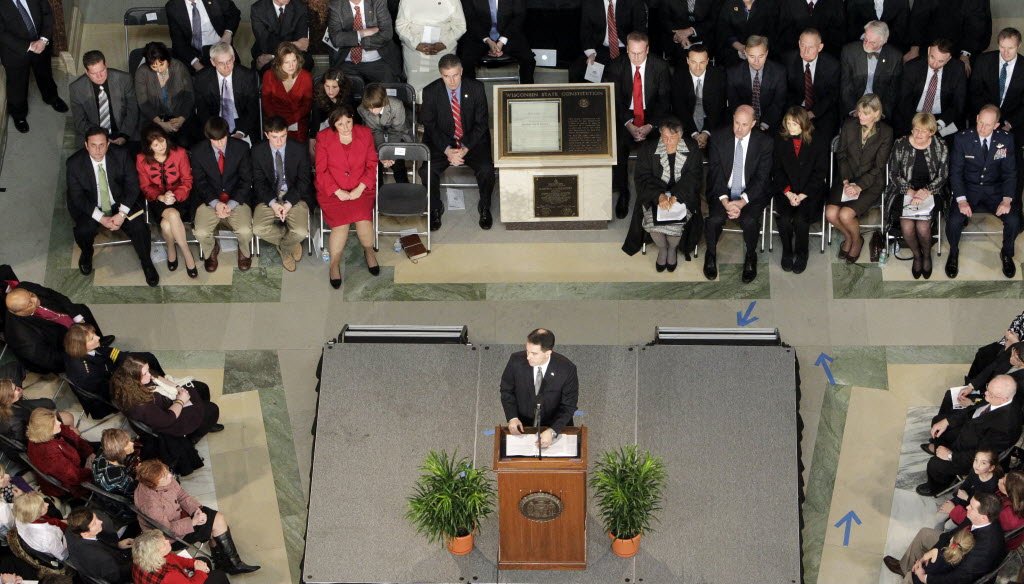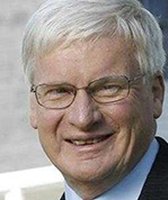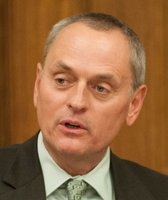Get PolitiFact in your inbox.

Gov. Scott Walker will be sworn in for a second term at 11 a.m. Jan. 5, 2015. He is pictured here at his first inauguration ceremony, Jan. 3, 2011.
Key promises made by Gov. Scott Walker in the 2014 campaign that delivered a second term touched on a wide range of issues, but can be characterized with a four-word phrase: More of the same.
More tax cuts.
Another tuition freeze.
More schooling options for more parents.
More protection for roadbuilding funds.
During Walker’s first term, we tracked the governor’s performance in achieving 65 promises made during the 2010 campaign on our Walk-O-Meter. Here’s how it came out:
Promise Kept: 57 percent; Compromise: 17 percent; Promise Broken: 25 percent (including his promise of 250,000 new private-sector jobs). We left one promise -- "Create 10,000 new businesses" -- at In the Works. Once final data is available, we will give it a final rating.
Walker will be inaugurated for his second term at 11 a.m. Jan. 5, 2015. This time around, we found fewer concrete pledges from Walker, and an intense focus on economic issues. In all, we’ll track Walker’s progress on 21 new promises.
His 2014 race against Democratic ex-businesswoman Mary Burke turned on pocketbook concerns. Unlike in 2010, when Walker and Democrat Tom Barrett vied for an open seat, Walker ran on his record as governor and broke less ground on new approaches to governing.
Notably, the Republican from suburban Milwaukee declined to promise that his second administration would coincide with a particular number of new jobs created.
As of August 2014, when we rated the first-term jobs pledge as Promise Broken, he was 147,000 jobs short. Through November 2014 he was 112,000 shy of the mark.
Prospects for the promises
As in his first term, Walker has a friendly Legislature as a partner. Republicans expanded their margins in both the Assembly and the Senate.
And he can accomplish several of his promises on his own authority without legislative action.
Some challenges await Walker nonetheless, said Henrik Schatzinger, a Ripon College political science professor.
Walker’s nascent presidential campaign could prove distracting, and opposition could develop in the bureaucracy to Walker’s plans to consolidate state agencies, Schatzinger said. Tensions could arise within the GOP over how to close a projected budget shortfall and on which taxes to reduce, he added.
"There will be some tough choices," Schatzinger said.
Joe Heim, a UW-La Crosse political scientist, said Walker "ought to be able to get virtually everything he wants." If not, it’s a sign of weakness in his ability to lead the Republican caucus, Heim said.
In the 2014 campaign, the governor promised smaller property-tax bills in 2018 (when his new term is finished) compared to 2010 for the average property owner; lower income taxes; reduced tax burdens every year for "working families and seniors"; and no state sales tax increase.
Those pledges came after Walker and Republican legislators passed several tax-cut measures and sharply limited the ability of local governments and schools to raise property taxes.
In his race against Burke, Walker promised universal access to college courses regardless of where students live or their family income. He pledged another University of Wisconsin System tuition freeze, a new freeze on technical college tuition, and greater access to tuition tax credits and higher education grants.
For private K-12 schools, he said he would support a major boost in the enrollment cap in the statewide private school voucher program -- or elimination of the cap.
He said during the campaign that he will seek a repeal of the Common Core State Standards for schools.
On other topics, Walker promised to require drug tests for those applying for unemployment benefits and for some food stamp applicants.
He said he would stand against tolls to fund road projects, and repay previous "raids" from the state transportation fund.
He promised to work with utilities to reduce energy costs, and sell off some state assets to reduce debt.
Walker, it stands to reason, will have trouble accomplishing all this if he doesn’t stick around for a full term.
His continued interest in exploring a 2016 presidential bid prompted a question at the Oct. 10, 2014 gubernatorial debate: Would he promise to serve a full term if re-elected?
He said he was "committed" to the position and planned to be in the job for the full four years.
Some media saw that as a pledge, while others saw it as something just short of that. We think many listeners likely heard it as a promise, and we’ll treat it as such.
To be sure, some Walker backers may not mind if he breaks that promise -- if it means PolitiFact is tracking President Walker’s promises come 2017.
Our Sources
PolitiFact Wisconsin research















































